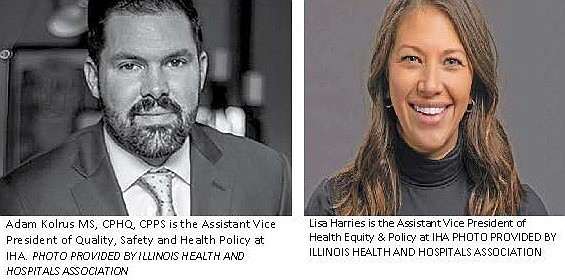Organization looks at ways to increase racial equity in healthcare
The Illinois Health and Hospital Association (IHA) includes 210 hospitals across Illinois. It has long been committed to improving and strengthening access to healthcare in the State. During 2020, with COVID-19 and the murder of George Floyd, IHA wanted to take bold steps to address racial health inequities. It established a committee on health disparities, which is comprised of 25 hospital CEOs from across the state.
In addition to the committee, IHA also established the Health Equity Leaders Work Group, and it released that the Illinois Health and Hospital Association also created the Racial Equity in Healthcare Progress Report, also known as The Progress Report.
The Progress Report is made of four pillars: Our People, Our Organization, Our Patients and Our Community, which the organizations are scored on. The report was born out of a partnership with IHA, Rush University Medical Center and University of Chicago Medicine to create an assessment. There were 135 hospitals that filled out the assessment.
According to Adam Kolrus, MS, CPHQ,CPPS, the Assistant Vice President of Quality, Safety and Health Policy for IHA, in the people pillar, organizations were challenged to evaluate their own boards, leadership teams and employees, as well as their patients to look at whether they are diverse, equitable and inclusive.
“What the data was showing us on the racial demographic front is that of the patients, those 135 hospitals are serving 40% are Black, Latino, brown or other, but the board representation of the 135 hospitals was 81% white and their leadership teams are 76% white,” Kolrus said.
IHA is asking the State of Illinois and organizations, if those organizations are exercising equitable care if, from a leadership perspective, it is not representative of the communities those organizations are serving. IHA also is challenging organizations to identify clinical inequities within the communities they are serving, including diabetes and maternal health.
The report was meant to center on racial equity, promote organizational growth and mobilize organizations to action. Within the report, there is programmatic infrastructure in place so that after the organizations take the assessment and analyze the data, they can put together action plans they can share with their leadership and their communities.
On Friday, May 13th, IHA hosted Health Equity Action Day, with between 1,500 to 2,000 participants signed on. The IHA encouraged member organizations to create Health Equity Days where they gathered people to join in on the event. The event is meant to celebrate the work that the member organizations are doing to advance health equity and to inspire other member organizations to continue on the health equity journey, or to get started. During Health Equity Action Day, organizations were showcased that embodied one of the four pillars. They included Ann & Robert H. Lurie Children’s Hospital, Edward Elmhurst Health, Memorial Health in Springfield and OSF St. Luke in Kewanee.
Latest Stories
- Reminder: Taxes are due December 15, 2025. Pay now to avoid late fees. Struggling financially? Our Payment Plan Calculator is a tool you can use
- TWO GOVERNMENTS TO FORMALIZE HISTORIC PARTNERSHIP IN ADDRESSING MENTAL HEALTH CRISIS DURING THE HOLIDAY SEASON
- Trump's Policies Negatively Target Women
- Assessor Kaegi, South and West Side Community Leaders Urge Legislature to Pass Property Tax Relief, Condemn Board of Review's Large Breaks for Downtown Commercial Properties
- State Farm and The Salvation Army Launch National Donation Drive to Support Families This Holiday Season
Latest Podcast
Stacy Davis Gates

